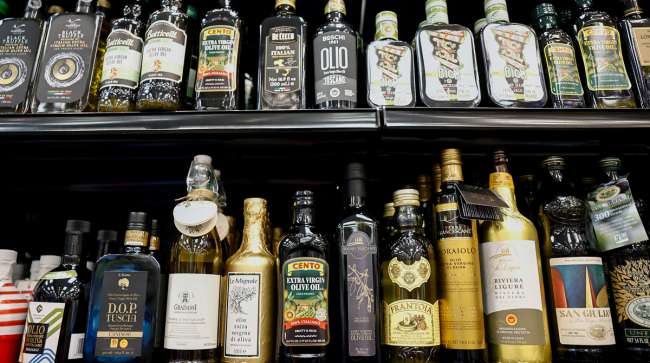Imported Italian olive oils in a store in Arcadia, Calif. (Mario Tama/Getty Images)
Tarptent, a California-based seller of outdoor gear, started offering a discount late last month on its website to push back against President Donald Trump’s duties. The activation code: “tariffs suck.”
Sales surged about 25% as customers sought to get ahead of price increases, according to Henry Shires, the company’s president. The firm produces most of its catalog in China, which Trump plans to slap with tariffs above 100%.
“It was to make our point that prices are going to go up, so this is your last chance to get something pre-tariff,” Shires said in an interview.
Trump’s tariffs are rattling U.S. consumers, who are stocking up on everything from cars to olive oil and iPhones. The behavior offers some good news for businesses that are rushing to figure out how to respond to the upheaval caused by Trump’s global trade war.
Antonio Moore, a 45-year-old Los Angeles attorney, is loading up on enough Arm & Hammer deodorant and Colgate toothpaste to last months. On social media, he’s encouraging others to do the same before they run out of time.
“People are approaching tariffs as though they are an idea,” Moore said in an interview. “They aren’t. They are real and, if fully implemented, will have a real impact.”
Car Buying
Fears of tariffs spurred car buying in the first quarter. And visits to auto dealerships picked up in the last week of March, including gains at retailers who sell Toyota Motor Corp. and Hyundai Motor Co. vehicles, according to foot traffic data from Placer.ai.
Jeep maker Stellantis NV is offering new discounts across its brands while Hyundai pledged to hold pricing steady until early June. It’s all part of an effort to ease fears that Trump’s 25% will cause a spike in prices.
RELATED: Stellantis Offers Tariff Aid to Struggling Parts Suppliers
At Apple Inc. stores, customers are pouring in to nab phones before tariffs on China are enacted. Employees from different Apple locations across the country said stores filled with customers last weekend.
In March, sales through Apple’s stores and website rose about 6%, according to Bloomberg Second Measure, which tracks debit and credit card purchases. That was the best performance since November. The growth was driven by a jump in average transaction value, pointing to shoppers picking up pricier items.
Best Buy Surge
A similar pattern unfolded at electronics retailer Best Buy Co., which sells Apple and Samsung products. Last month sales jumped roughly 8%, the best monthly performance since 2021, according to Bloomberg Second Measure.
It’s not just Americans stocking up. On April 8 at an Apple store in midtown Manhattan, Ámbar de Elía, from Buenos Aires, saw news on tariffs and decided now was the best time to splurge on an iPhone.
“Everyone is here because of the fear,” de Elía said. “They don’t know what’s going to happen. If we have the possibility to buy something at a lower price of course we are going to.”
Beatrice Ughi, founder of Italian-goods importer Gustiamo, said orders from customers on her website, which offers items such as olive oil and capers, jumped to an average of $160 from $110 since Trump announced more tariffs last week. Activity has also picked up on Gustiamo’s Amazon storefront, which normally has smaller order sizes.
“It’s exactly the same feeling of panic from the consumer that we had when COVID erupted,” Ughi said.
Consumers probably won’t see a specific tariff charge. When a shopper orders, say, olive oil from Italy or a watch from Switzerland, the tariffs are levied on the importers at the moment the items go through U.S. customs.
Those importers — online sellers hawking their wares on Amazon or suppliers selling goods to Walmart and other retailers — are on the hook to pay those tariffs but often pass along the costs to the end buyer.
EU Tariffs
EU goods face 20% tariffs, threatening Gustiamo’s business model of bringing Italian foods to consumers and restaurants in the U.S. Ughi said that the bulk of her 300-item portfolio can’t be replicated stateside. Take a $37.50 jar of bitter honey from Sardinia or jarred Piennolo tomatoes, which according to Gustiamo’s website grow in the Vesuvius National Park and retail for $13.50.
Ughi said her suppliers, many of whom run small operations, don’t have the profit margins to cover the tariffs — and neither does Gustiamo. She’s hoping the levies will be rolled back or moderated. Otherwise, her business will have to raise prices.
“We don’t have the room to absorb any of this,” Ughi said. “So we hope that the chefs and the general public will continue to support us.”
Some business owners would like to stockpile, but can’t afford it. Take Dominick Purnomo, who owns several restaurants in upstate New York, from a brasserie to a rooftop bar. His eateries import all sorts of items from the EU.
“I would love to buy 50 cases of pinot grigio, but I can’t outlay $10,000 right now,” he said. “We’re not in growth mode. We’re in wait-and-see mode. We’re not looking beyond the next 90 days.”






